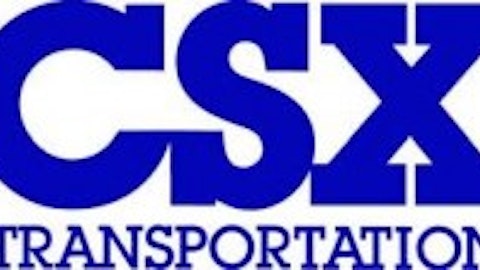Kansas City Southern (NYSE:KSU)‘s second quarter EPS of $1.03 marginally beat the estimates by $0.01, while revenues of $585.8 million were $16.98 million lighter than expectations. Although the operating ratio of 68.1% represented a decline of 0.2 percentage points from the same quarter last year, if lease termination costs for 2014 are excluded, the ratio increased by 1.1 percentage points. Sales in the energy carload segment fell by 31% during the quarter owing to weakness in coal and frac sand demand. Owing to a decline in metals and scrap transport, volume for industrial & consumer products slid by 5%. On the bright side intermodal volume was up by 2% and lower fuel costs lowered operating expenses by 8%. Commenting on the company’s quarterly performance CEO David L. Starling said, “KCS continued to scale its operations in both the U.S. and Mexico and has made strides in improving its network fluidity. Our actions contributed to the Company attaining a solid second quarter operating ratio despite volume challenges, particularly in its Energy commodity group. We expect our system performance and operating metrics to continue to improve throughout the remainder of the year.”

Smart money has a mixed outlook towards Kansas City Southern (NYSE:KSU). The funds invested in the company, among those that we track, decreased to 22 at the end of March compared to 26 at the end of last year. However the total investment of these firms increased to $957.62 million from $687.04 million during the same period. This bullish behavior precipitated despite a drop of more than 15% in the stock price during the first three months. However despite a 5% gain this morning following the earnings news, that bullishness has yet to pay off, as shares are down by about 5% since the end of the first quarter.
Most investors can’t outperform the stock market by individually picking stocks because stock returns aren’t evenly distributed. A randomly picked stock has only a 35% to 45% chance (depending on the investment horizon) to outperform the market. There are a few exceptions, one of which is when it comes to purchases made by corporate insiders. Academic research has shown that certain insider purchases historically outperformed the market by an average of seven percentage points per year. This effect is more pronounced in small-cap stocks. Another exception is the small-cap stock picks of hedge funds. Our research has shown that the 15 most popular small-cap stocks among hedge funds outperformed the market by nearly a percentage point per month between 1999 and 2012. We have been forward testing the performance of these stock picks since the end of August 2012 and they have returned more than 139% over the ensuing 34 months, outperforming the S&P 500 Index by 81 percentage points (read the details here). The trick is focusing only on the best small-cap stock picks of funds, not their large-cap stock picks which are extensively covered by analysts and followed by almost everybody.
We also track insider activity to give a better idea of a stock’s future prospects. While no insider purchases have materialized so far this year, prominent insider sales include that by Chief Legal Officer, William Wochner, who has sold about 20,000 shares this year, and by Director Michael Haverty, who disposed of about 81,000 shares in late February.
In order to pass a verdict on Kansas City Southern (NYSE:KSU) we must take a closer look at the hedge fund activity surrounding the company.
How are hedge funds trading Kansas City Southern (NYSE:KSU)?
Heading into the second quarter, a total of 22 of the hedge funds tracked by Insider Monkey were bullish in this stock, down from 26 funds at the end of the previous quarter. With hedge funds’ sentiment swirling, there exists an “upper tier” of notable hedge fund managers who were increasing their holdings considerably.
According to hedge fund experts at Insider Monkey, Viking Global, managed by Andreas Halvorsen, holds the biggest position in Kansas City Southern (NYSE:KSU). Viking Global has a $696.5 million position in the stock, comprising 2.7% of its 13F portfolio. Coming in second is Fisher Asset Management, led by Ken Fisher, holding a $75.9 million position; 0.2% of its 13F portfolio is allocated to the company. Some other members of the smart money that hold long positions consist of Richard Chilton‘s Chilton Investment Company, Jim Simons‘ Renaissance Technologies, and Israel Englander’s Millennium Management.
Seeing as Kansas City Southern (NYSE:KSU) has witnessed declining sentiment from the smart money, it’s easy to see that there lies a certain “tier” of hedgies who were dropping their entire stakes during the March quarter. At the top of the heap, John Brennan’s Sirios Capital Management dropped the biggest stake of the more than 700 funds followed by Insider Monkey, valued at about $17.7 million in stock. John Murphy of Alydar Capital was right behind this move, as the fund sold off about $4.5 million worth of shares. These transactions are important to note, as aggregate hedge fund interest fell by four funds last quarter.
Our outlook for Kansas City Southern (NYSE:KSU) is bearish until some signs of recovery can be seen in the industry, despite the growing hedge fund investments.
Disclosure: None




